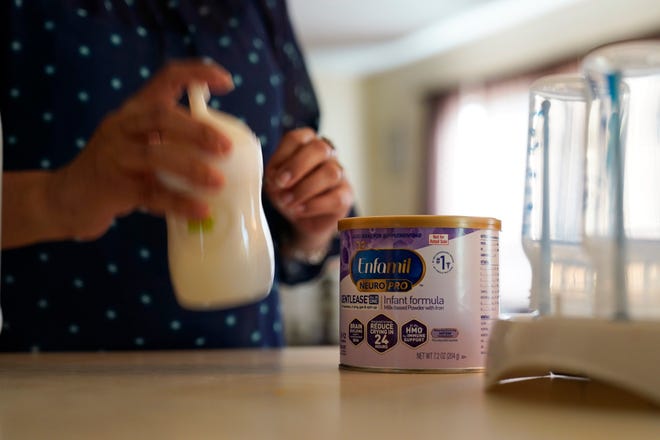MEMPHIS — Two children had to be hospitalized at a Tennessee children’s hospital due to the ongoing national shortage of baby formula, a physician at the hospital said.
Both children required a special, amino acid-based formula because they have short bowel syndrome — a condition meaning they are unable to efficiently digest food because they have fewer intestines.
While one child was discharged Tuesday, the other remained at Le Bonheur Children’s Hospital in stable condition after receiving care for dehydration and complications from a lack of nutrients they would normally receive through specialized formulas produced by Abbott Laboratories.
FDA reaches deal with Abbott:With baby formula factory reopening, how long until it’s back on shelves?
Dr. Mark Corkins, a pediatric gastroenterologist at the hospital, often treats children with short bowel disease. Those young patients rely on amino-acid based formulas, Corkins said, adding Abbott currently produces about 80% of that type of formula on the market.
“As soon as I heard about the contamination at Abbott’s warehouse, I knew it was going to be a crisis,” Corkins said. “The patients that I treat, they’ve lost some of their intestines. They need to immediately absorb these amino acids, they don’t have a regular digestive tract that absorbs [nutrients].”
The patients admitted to Le Bonheur were 5 years old and 8 years old. Children who have preexisting complications like short bowel syndrome require them to be formula fed vary in age. In other words, Corkins said, it’s not just infants and toddlers who are affected by the formula shortage.
While the number of children needing hospitalization due to the formula shortage at Le Bonheur is low, Corkins can’t rule out an uptick in patients needing similar care.
Baby formula 101:Everything you need to know during the baby formula shortage
“I’m not gonna hold my breath … just to be honest, I saw a different child today who was on an amino acid-based formula, and the mom has two cans left,” Corkins said.
Corkins said he can only tell parents facing a nightmare scenario to take it day-by-day.
Medical device producer and healthcare company Abbott Laboratories first recalled dozens of types of its Similac, Alimentum and EleCare formulas in February. That set many parents and caregivers on a buying spree that emptied store aisles.
On Monday, Abbott announced it reached a deal with the U.S. Food and Drug Administration to reopen a Michigan factory that was shut down earlier this year amid the recalls. The shutdown contributed to the formula shortage.
Production at the site could restart within two weeks, the company said Monday.
Baby formula shortage costing parents:‘It’s a desperate situation for many families’
But even as production restarts, Corkins said, it could take up to eight weeks or more for formulas, including specialized amino acid-based formulas, to hit the shelves.
“One of the things that I hope comes out of this is that I want people to say, ‘This can never happen again,'” Corkins. “I don’t want to do this again. Can Congress do something? Let’s find a way to think about this. Smart people need to figure out a way to make sure this never happens again.”
Over the next few weeks, as formula remains scarce, Corkins said he wants parents to know two vital things.
“Don’t dilute formula, because you think you’re cutting the nutrients in half. And you’re not gonna get the salts and stuff you need. And please, please don’t try to make formula at home.”
Abbott Chairman and CEO Robert B. Ford said the company’s “number one priority” was getting quality formula to the children and families who need it.
“We know millions of parents and caregivers depend on us and we’re deeply sorry that our voluntary recall worsened the nationwide formula shortage,” he said.




